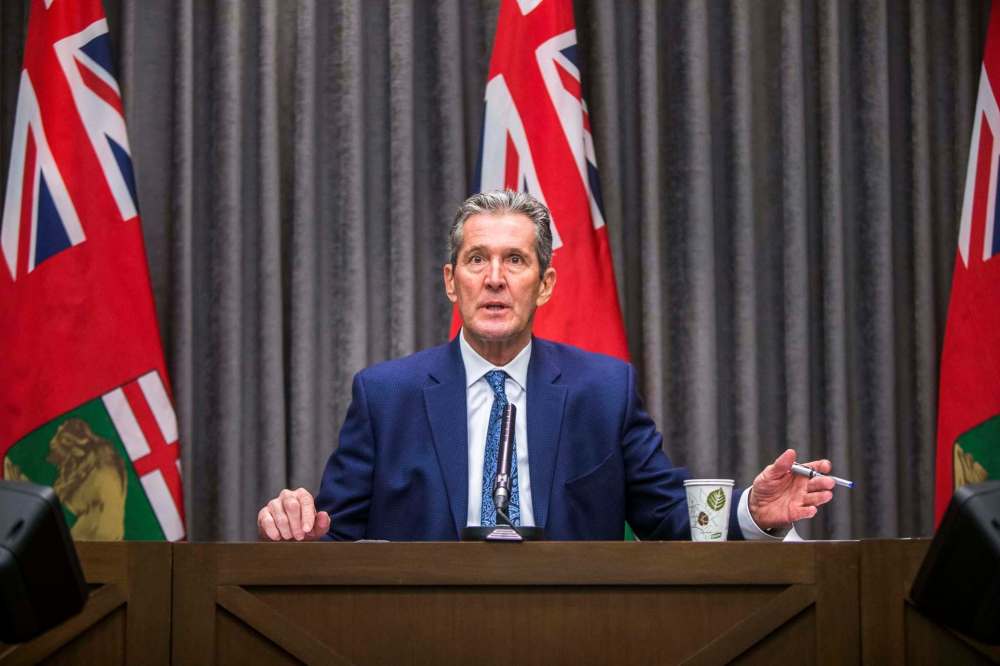Province MIA in fight for business sector
Read this article for free:
or
Already have an account? Log in here »
To continue reading, please subscribe:
Monthly Digital Subscription
$0 for the first 4 weeks*
- Enjoy unlimited reading on winnipegfreepress.com
- Read the E-Edition, our digital replica newspaper
- Access News Break, our award-winning app
- Play interactive puzzles
*No charge for 4 weeks then price increases to the regular rate of $19.00 plus GST every four weeks. Offer available to new and qualified returning subscribers only. Cancel any time.
Monthly Digital Subscription
$4.75/week*
- Enjoy unlimited reading on winnipegfreepress.com
- Read the E-Edition, our digital replica newspaper
- Access News Break, our award-winning app
- Play interactive puzzles
*Billed as $19 plus GST every four weeks. Cancel any time.
To continue reading, please subscribe:
Add Free Press access to your Brandon Sun subscription for only an additional
$1 for the first 4 weeks*
*Your next subscription payment will increase by $1.00 and you will be charged $16.99 plus GST for four weeks. After four weeks, your payment will increase to $23.99 plus GST every four weeks.
Read unlimited articles for free today:
or
Already have an account? Log in here »
Hey there, time traveller!
This article was published 20/04/2020 (2058 days ago), so information in it may no longer be current.
The focus of Manitoba’s COVID-19 efforts has, quite properly, been on slowing the spread of the virus and providing the necessary resources so we can enable our public-health system to properly treat all those who contract the virus.
We seem to be doing well in that battle, for which the provincial government, our health-care workers and the entire community can take real pride. But there is another battle to be waged, which is just coming into focus and has the potential, if we don’t win it, to be far worse in its impact than the health battle we have been fighting.
As part of the fight against COVID-19, governments have essentially placed large sectors of our economy into an induced coma. Many businesses and community organizations, large and small, have been forced to close their doors or restrict their activities to such a degree that they cannot pay their bills or deliver their services.
There is nothing fundamentally wrong with these entities; they were successful before the pandemic and, if they can get to the other side of this crisis, they will be successful in the future. However, they were never designed to be shut down completely for such a length of time, and many may not be able to reopen when the all-clear signal is given.
The suggestion I’ve heard from a few, that this economic crisis is simply a matter of a culling of the weak, is patently absurd.

When companies shut down, people lose their jobs permanently — it’s one thing to provide short-term unemployment insurance to people, but it’s a completely different thing to find replacement jobs after businesses have closed. As well, when businesses close, they stop using and paying for each other’s services, which puts huge pressure up and down the value chain.
So many co-dependencies between businesses, and between businesses and individuals, are being shattered that we run the risk of emerging from our houses in several weeks or months with our health intact, only to find an economic and community wasteland. We need to find ways to keep the “pilot lights” of these organizations on during this period of isolation and economic shutdown, so that they can help lead us through the return to “normalcy” that we all desire.
During my years in business, I have seen many periods of economic stress, but nothing approaching this. Unemployment rates, lack of consumer confidence and diminished financial capacity of businesses are at unimaginable levels, which makes the suggestion that we can expect a quick recovery a “pie in the sky” assertion. Getting through this will be in an enormous undertaking, and will require a complete all-of-country approach.
The most important element of this undertaking, at least in the short term, is massive government funding to support our business value chains. This funding will need to be at levels at which no government will be comfortable, but it is obvious that our entire non-governmental economic structure is threatened, and only financial support to keep the system operating until doors are reopened will work.
The scope of this support is going to place significant stress on the finances of government at all levels.
This is what allowed us to get through the crisis of 2008-09. The difference here is that we are facing a general collapse of our economy, not just of our financial system and a few key industries — which is why the level of support needs to be so vast.
The scope of this support is going to place significant stress on the finances of government at all levels. When this is over, there will be a major restructuring of these finances, but first we need to get our businesses over the hump so that they and their employees can play a central role in the recovery process.
I am concerned that our provincial government does not appreciate the importance of the role it must play in this economic war. It seems, from its actions (or inactions), that it expects the federal government to do all the heavy lifting with respect to the economy, while the province focuses on the health crisis.
The province has been sending the message that it is more concerned with protecting its own financial position than in helping many of its citizens who have been hurt through no fault of their own. While I believe the federal government has the best tools to address the economic needs of Canadians, and that Manitobans should take full advantage of programs announced by the federal government, there is a vital role for the province to play in helping Manitobans survive this war.
Here’s what I think the province should do:
1) Start by acknowledging we are in an economic crisis that is as much of an existential threat to our province as the COVID-19 war, making it clear to Manitobans that we can, and must, fight both wars at the same time, and accepting its leadership role on behalf of Manitobans on both fronts. Recognize that it is more important in these circumstances to try to protect as many organizations as possible, rather than focusing on the protection of its own financial position.
2) Engage with Manitobans in different sectors in order to fully understand the scale of this challenge so it can properly advocate for Manitobans. Federal support programs are being developed on the fly, based on evolving knowledge of the problems. The province can play a role in shaping them and in making sure Manitobans are taking full advantage of the various federal programs.
3) Develop and fund provincial programs which fill gaps that are identified in the federal programs. Don’t try to pay for them by taking money from other important areas of responsibility, such as education and social services, because all this does is shift the problem to them. This will be difficult to swallow for a provincial government that prides itself on fiscal responsibility, because I think it could involve hundreds of millions of dollars in short- to medium-term funding to businesses and not-for-profits, and will require innovative loan and equity programs.
But if we don’t do this, we will find that a number of otherwise-viable Manitoba organizations don’t qualify under the federal programs, and will not survive.
4) Build a proper road map for how Manitoba phases back into a “new normal” of economic activity that is co-ordinated with the necessities of our health-care initiatives. We’ve all been traumatized by this situation, and we all need permission/encouragement to start back up again. The province’s leadership is required to show us the way forward.
This roadmap should include:
● A plan to open back up, built in phases, tailored with an industry-by-industry perspective, sensitive to the need to protect those who are most vulnerable, and based upon the achievement of appropriate targets.
● A containment plan which features proper testing — not just for those who may have the virus, but also for those who have already had the illness and are now well — and robust contact tracing.
● Rules governing physical distancing and hygiene that can be followed in the workplace.
● Changes to government regulations and bylaws which will facilitate a post COVID-19 recovery.
5) Finally, prepare a plan for how Manitoba will be restored and reshaped after this period of re-entry is completed. A large piece of this will be restoring the finances of the province and our large municipalities. The federal government will have to be a big contributor to this, as it will in all provinces.
In suggesting all of this, I am cognizant that we can’t expect government to have all of the answers or all of the resources. As Manitobans, we have prospered most when government and all areas of the community work together, and I believe that these processes should be formalized by the immediate establishment of community task forces to address key issues, with participation from government, business, labour, academia, health care and the not-for-profit sectors.
These are extraordinary times which require courageous community leadership and our community’s collective confidence so we can recover from what has been thrown in our way. I am an optimist, and I believe we will get through this. But we need, in the short term, to protect our community and its most important assets, even if that requires our governments taking on financial risk which, in normal times, no one would countenance.
If we do this, I am confident that we will win both of these wars and continue to thrive in the years ahead.
Sandy Riley is a Winnipeg lawyer and business executive who previously served as chairman of Manitoba Hydro.







